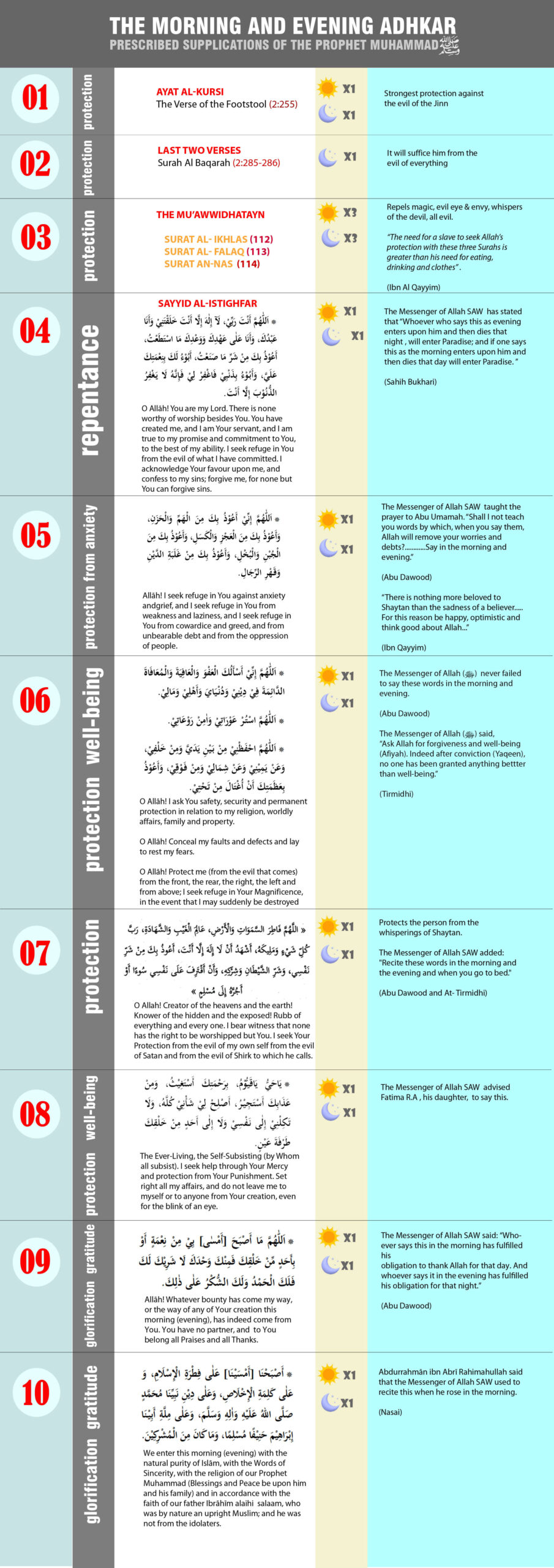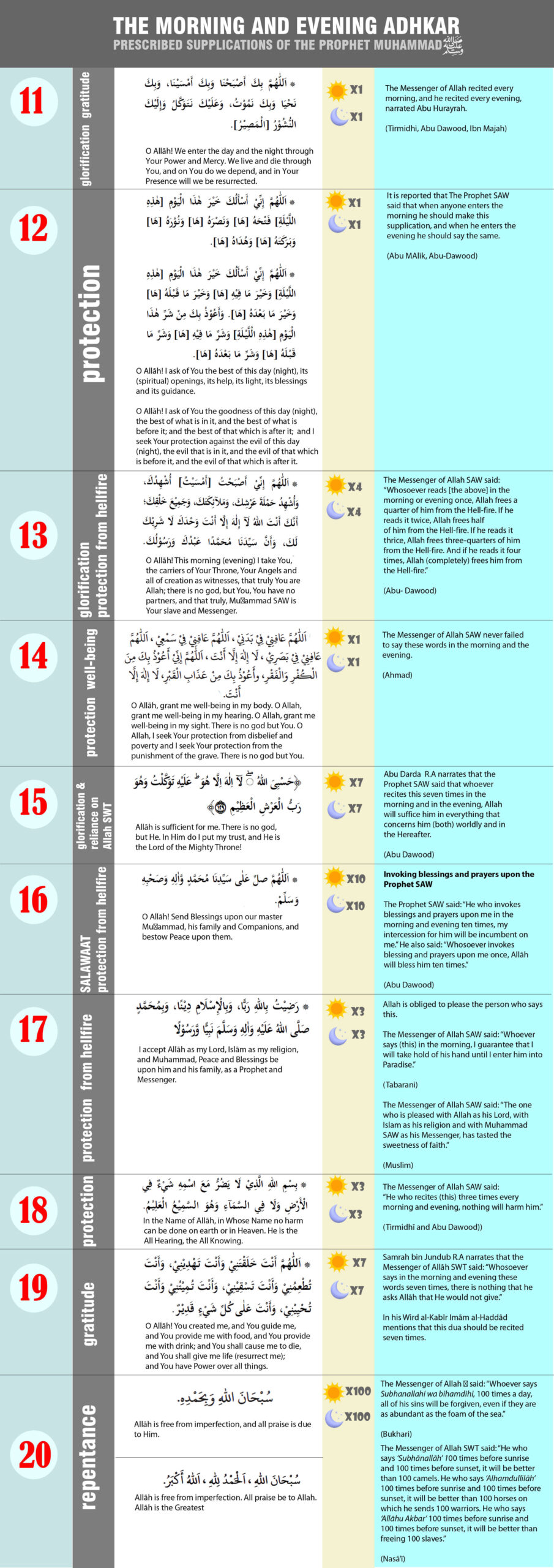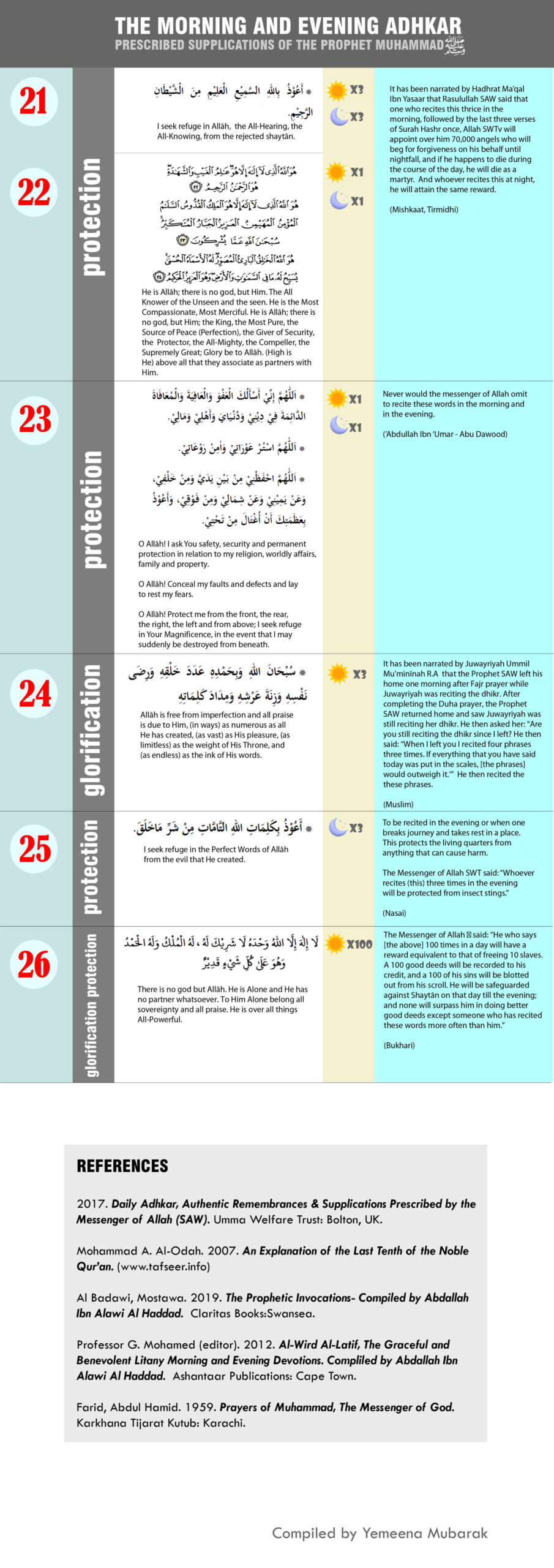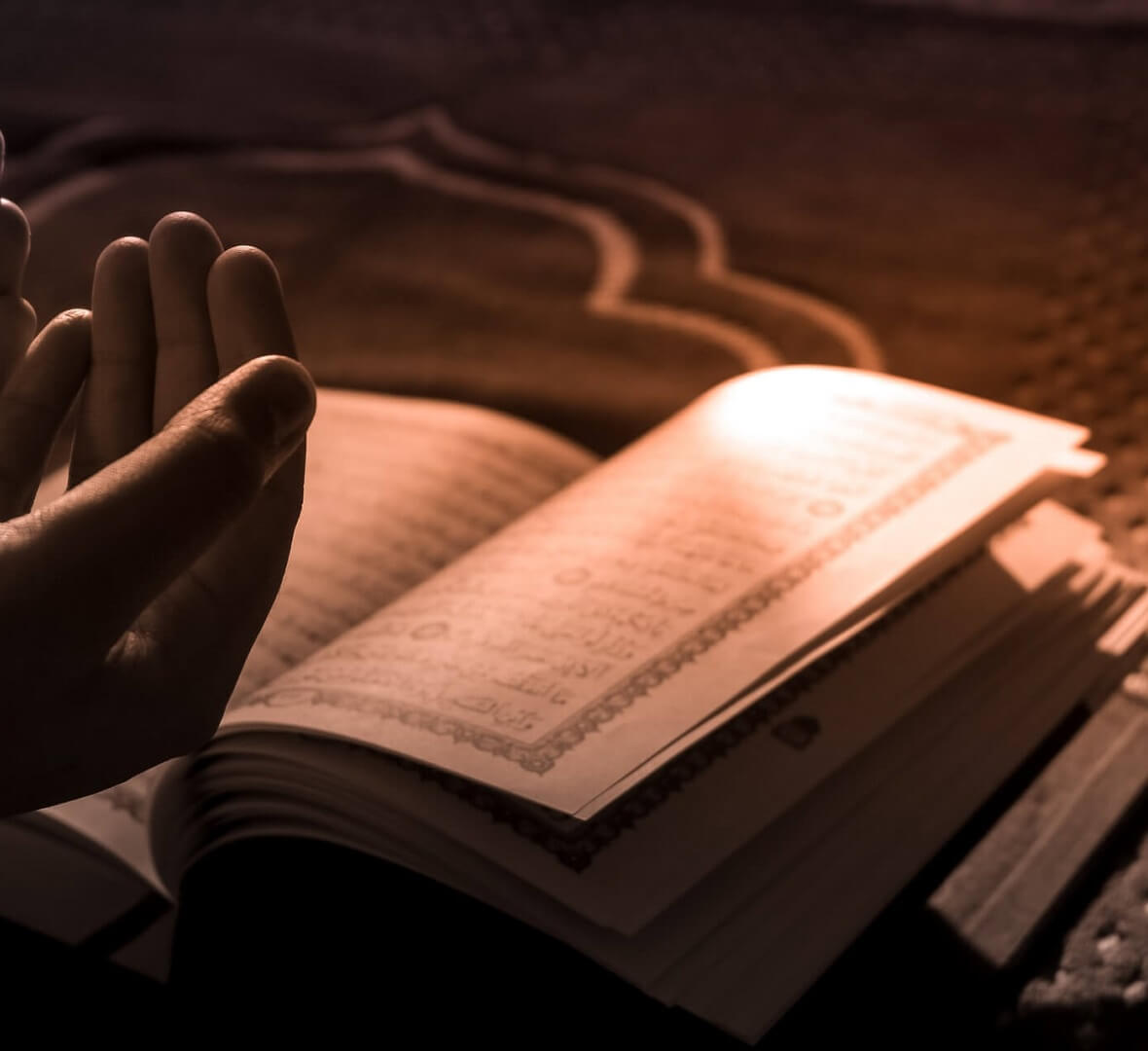In the previous article on morning and Evening Adhkar, it was mentioned that the Adhkar is a series of invocations dedicated to the remembrance of Allah and that this remembrance is conducted in a recurrent and consistent manner every morning and evening. Furthermore, the individual invocations that form the body of Adhkar are drawn from the Sunnah because these are invocations prescribed to us by our beloved Prophet Muhammad (SAWS).
Adhkar is a remedy for the heart’s maladies and a tool to achieve a sense of tranquility in the entire being that the Quran itself expounds. The previous article delved deeper into the aspects of Adhkar. This article looks at types or components of Adhkar, the manners in which they have been composed for easy recitation, and provides a guided format for its recitation based upon several sources of reference (infographics).
Click here to download the PDF file for the list of Morning and Evening Adhkar in English.
Components of Adhkar’s Invocations
How can we broadly categorize the prayers to have a better understanding of them? The various invocations fall under one or more of these categories.
1. Protection (seeking refuge in Allah SWT)
Seeking refuge in Allah SWT is very broad. Various invocations focus on various entities from which refuge is sought. These include;
- Refuge from shaytan himself.
- Refuge from the punishments of the grave, day of judgment, and hellfire.
- Refuge from the evil of oneself, and the evil of other creations like sihr.
- Refuge from various physical and emotional maladies like anxiety, fear, grief, and decrepit old age.
- Refuge from personal problems like debt and poverty
- Refuge in disbelief from the oneness of Allah.
2. Glorification of Allah SWT
Glorification of Allah SWT is located in the specific invocations that speak of having entering either the morning (Sabah) or the evening (Masaa) through Allah’s power and might. It is also located in one of the greatest most powerful dua of all times (‘La Ilaha illallahu, wahdahu la sharika lahu, lahul mulku, walahul hamdu, wahuwa ‘alaa kulli shai’in qadir)
‘Amr ibn Shu’ayb reported: The Prophet, peace and blessings be upon him, said, “The best supplication is that which is made on the day of Arafat. The best of it is what was said by myself and the prophets before me: There is no God but Allah alone, without any partners, unto Him belong the dominion and all praise and He has power over all things.” Sunan al-Tirmidhī 3585
This is such a powerful dua because it is the message of all of the prophets (peace be upon them all) and the Prophet Muhammad SAWS is emphasizing the message and the importance of it. This dua affirms one’s Tawheed and saves one from hellfire.
3. Gratitude (Shukr)
Again, the specific Duas of entering the morning (Sabah) and evening (Masaa) clearly exhibit gratitude towards Allah for blessing us with the bounties of the day and night. Gratitude is a fundamental element of faith. Allah mentions this in several places in the Quran:
“Indeed, We blessed Luqmân with wisdom, ˹saying˺, “Be grateful to Allah, for whoever is grateful, it is only for their own good….” (Surah Al Luqman:12)
Those who desire worldly gain, We will let them have it, and those who desire heavenly reward, We will grant it to them. And We will reward those who are grateful. (Surah Ala Imran:145)
Ibn Al-Qayyim al- Jawziyah succinctly and comprehensively states that there are three stages of gratitude:
- Feeling it in the heart
- Expressing it on the tongue
- Acting upon it through obedience, devotion, and good deeds
Therefore, dhikr is very much a part of the second stage as we clearly utter words of gratefulness to Allah.
4. Repentance (Istighfar)
Aside from gratitude, seeking repentance is the next best way to earn rewards from Allah SWT and be saved from hellfire. Allah SWT says in the Quran:
“And O my people! Seek your Lord’s forgiveness and turn to Him in repentance. He will shower you with rain in abundance, and add strength to your strength. So do not turn away, persisting in wickedness.” (Surah Al-Hud:52)
“….Surely Allah loves those who always turn to Him in repentance and those who purify themselves.” (Surah Al Baqarah:222)
The master dua for repentance, Sayyid al Istighfar, is part of the daily Adhkar.
5. Seeking assistance and well-being from Allah SWT
The invocations that seek Allah’s assistance, are several. In many parts of the Adhkar, they become part of supplications of gratitude, glorification, protection, and repentance. This is because seeking Allah’s assistance cannot be achieved without recognizing Allah SWT’s authority over everything and accepting our own limitations. Seeking help and well-being is in many forms. Protection is the primary help that is sought, and therefore it is mentioned separately due to its abundance in the Adhkar supplications.
Aside from protection, assistance is sought in:
– physical wellness
– the well-being of family, religion, property
– safety and security in one’s affairs
6. Salawaat (blessings upon the Prophet Muhammad SAWS)
Quran states:
“Indeed, Allah showers His blessings upon the Prophet, and His angels pray for him. O believers! Invoke Allah’s blessings upon him, and salute him with worthy greetings of peace.” (Surah Al Ahzab:56)
Salawaat, therefore, is a commandment of Allah, and reciting it is a fulfillment of Allah’s commandment.
The importance of salawaat is that whoever recites it will be rewarded with the intercession of Muhammad SAWS on the day of judgment.
The Prophet (PBUH) said:
“Whoever sends blessings upon me, Allah will send ten blessings (mercies) upon him.” (Muslim).
In another important hadith it is stated:
The companion Ubai Ibn Ka’ab asked the Messenger what would happen if he dedicated all of his supplications towards sending blessings on the Prophet Muhammad SAWS. The Prophet replied, “Your needs will be satisfied and your sins will be forgiven”.
Ubai bin Ka’ab (may Allah be pleased with him), who said; ‘I said, ‘O Messenger of Allah, I supplicate often, so how much of my supplication should I devote to you?’ He replied, ‘as you desire’. I said, ‘a quarter of it?’ He said ‘as you desire, but if you were to increase upon this, it would be better for you.’ I said, ‘half of it?’ He said, ‘as you desire, but if you were to increase upon this, it would be better for you.’ I said, ‘two-thirds of it?’ He said again, ‘as you desire, but if you were to increase upon this, it would be better for you.’ Finally I said, ‘and if I dedicate my supplication in its entirety to you?’ He said, ‘then your needs will be satisfied, and your sins forgiven.’ (Sahih Musnad Ahmed)
**The infographics place the various invocations in these mentioned categories along with the prescribed times of repetition and the benefits according to Hadith.
Composition of Adhkar
There is no specific composition of the Adhkar. The invocations may be read in an order that suits one the most. There are several books that provide a list of all the prophetic invocations in detail. However, some scholars have attempted to compile the invocations into a format to make it easier for recitation and memorization. Examples would be:
- al-Wird al-Yaumi fis-Sabaah wal-Masaa that appears in the book An Explanation of the Last Tenth of the Noble Quran by Mohammad A. Al-Odah.
- Al-Hizb al-A’zam wa al-Wird al-Afkham – by Mulla ‘Ali ibn Sultan Muhammad al-Qari.
- Wird Al-Shahir, also known as the Haddad Rathib and Al Wird Al-Latif, both compiled by Shaykh Abdallah Ibn Alawi Al-Haddad from Hadaramawt Yemen- a direct descendent of the Prophet Muhammad SAW.
Wird Al-Shahir A wird and Al Wird Al-Latif are more popularly known. A Wird is a litany one chooses to recite for invocatory purposes. Wird includes many of the recitations of the Adhkar as prescribed by the Prophet SAW as well as relevant Quranic verses. The awraad (pl. of wird) of Imam Abdallah Al-Haddad are in strict conformity with the Sunnah, and therefore one can rest assured he or she is following the prophetic instructions. (Al Badawi, Mostawa. 2019:26, The Prophetic Invocations- Compiled by Abdallah Ibn Alawi Al Haddad).
I will end this article with a quote from Hamza Yusuf. He says:
“Wird literally means ‘a place of water’, and this meaning is telling. A watering place is visited regularly not out of mere fondness but out of necessity. The spiritual aspirant should approach his wird with the same thirst and regularity he would his watering place. As water satisfies the body’s physical demand, so too does the wird bring the soul to a state of contentment, and eventually, delight.”
(In Al Badawi, Mostawa. 2019:17, The Prophetic Invocations- Compiled by Abdallah Ibn Alawi Al Haddad).





